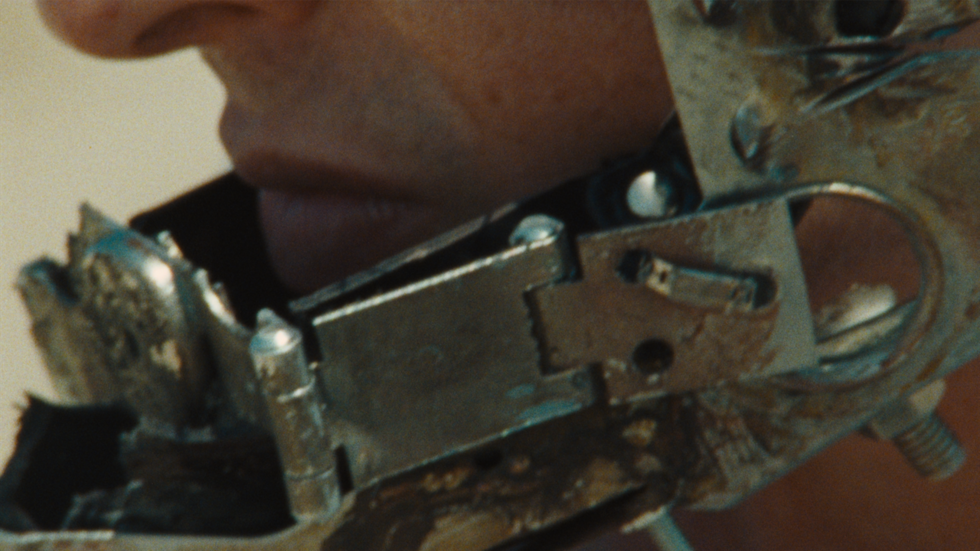The following interview contains light spoilers for Vulcanizadora.
In a Tribeca Festival filled with stories of friendships and fatherhood, none were quite as radical as Joel Potrykus’ Vulcanizadora. Plot details on the film have largely been kept under wraps and for good reason – it is best experienced as cold as possible, which may discourage you from even reading further into this article, but so be it – but the stage is set as two friends, Potrykus himself starring alongside long-time collaborator Joshua Burge, venture into the Michigan wilderness for a twisted ritual that goes unexplained for the film’s first half. Upon concluding the ritual, a scene so instantly climactic that it may leave viewers in a headspin, their lives are changed forever and they are forced to deal with the consequences.
Potrykus, who became a father five years ago, channels his own fears and insecurities raising his son (Solo, who is featured in the film) into Vulcanizadora, the story of two men stuck in arrested development within the inevitable cycle of fatherhood. The two men couldn’t be further apart at the film’s beginning yet, in the kind of unconventional way that only Potrykus’ somberly twisted mind could convey, they find themselves swapping places, one left to consider his place in a young boy’s life and the other left with nothing at all. The result is one of Tribeca’s most memorable and exciting films from a filmmaker who, despite years of indie prominence, appears to continue ascending toward his peak.
Geek Vibes Nation caught up with Potrykus and Burge mere hours before their World Premiere in Manhattan. Here is that conversation, edited for length and clarity. Topics of conversation include the Michigan dunes, shooting a feature film on 16mm for the first time, working with Solo Potrykus, and the merits of shooting microbudget indies in a corporatized industry.
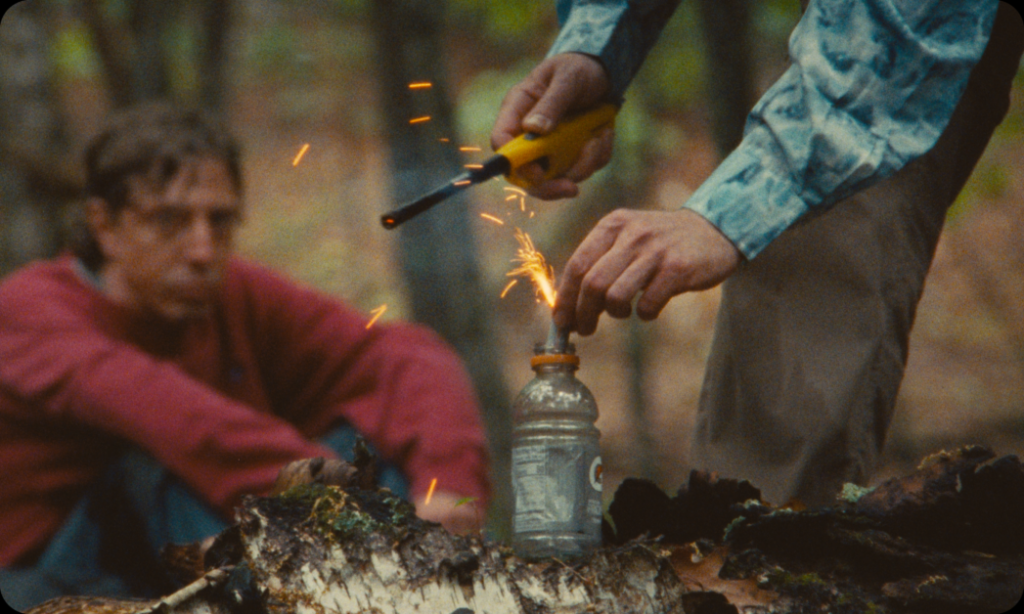
Talk to me about the name, Vulcanizadora. Where does it come from?
Joel Potrykus: Well, it’s a Spanish word that means “tire repair shop.” Josh and I are from Grand Rapids, Michigan and there was a tire repair shop on Division Street. I would always pass and it just said “vulcanizadora.” I was like, “That is the coolest word I’ve ever seen in my life.” I looked it up and saw what it meant and I was like, “[that’s] even cooler,” because it’s a beautiful word that sounds like a Pixies or Smashing Pumpkins album title and it just means “tire repair shop.” For years I’ve been trying to shoehorn it into a movie title. I was like, “No matter what, this movie is going to be called Vulcanizadora.” I wanted to see that on a poster.
Did the tire shop inspire the story in any way, or did you just insert that detail for the hell of it?
Potrykus: I kind of just inserted that detail in there, yeah. I was considering just leaving it at that and then people would look it up later. “Tire repair shop? Okay.” There’s a little tiny bit of it in the movie but not enough for me to care about involving mechanics.
Well, this is shot on location in Cedar Rapids. That’s where you’re both from, so I assume you’re familiar with the locations that you were shooting in. However, were there any new frontiers you discovered?
Potrykus: Actually, I’d never asked Josh if he had walked the dunes – the first half [of the film] is forest and beach dunes. I had been along that coast before. Had you ever walked the dunes?
Burge: Not up in that area where we were. We were outside of this town called Manistee.
Potrykus: Did you go to Rosie Mound back in college?
Burge: Yes, Rosie Mound in college, but that’s the furthest north. I’ve never even done the big bear thing that’s so popular. I’m limited to the lower West Coast of Michigan.
What’s the bear thing?
Potrykus: Sleeping Bear Dunes, which is along the West Coast of Michigan.
What’s interesting about you shooting on the dunes is that that kind of environment is not often associated with Michigan, at least not for people outside of the state.
Burge: Yeah, I wonder about that. When I moved to LA, everyone was like, “You gotta go check out the beach,” and when I went, I was like, “What is this crap?” [laughs] I was used to those pristine, gorgeous dunes, which I guess is a very unique geographic feature, but I had taken it for granted because I’d grown up in western Michigan.
Potrykus: There’s a line in the movie where Derek says, “There’s the ocean.” I think I put that in there because I felt like people wouldn’t believe that we shot in Michigan. Then, Marty goes, “That’s the lake,” which is true. People would have been like, “Oh, they’re trying to fake this. That’s not a lake, that’s the ocean,” so Derek had to acknowledge it. We’re really in Michigan, because it is pretty fucking majestic and awesome. It’s an ugly story to happen in a beautiful place. It was the perfect location.
You guys are really in the thick of those forests and dunes. Talk to me about the pros and cons of getting to shoot out there.
Potrykus: I think the con is that it’s hard to set up the camera and make it not look like a calendar. We were trying to avoid pointing attention to the beauty of our location. That’s a weird con, though. Another was that we didn’t plan for how exhausting and difficult it was going to be to lug the gear. Those dunes that we were going down, we had to go up those with sound gear and tripods and cameras and tables. Exhausting.
Burge: It was like a Fitzcarraldo situation.
Potrykus: Yeah, totally. It was.
[all laugh]
Burge: I wasn’t a part of the camera department, obviously, but I was terrified about things going wrong. I had never thought about sand getting into canisters, for example. I was terrified of that on behalf of four other people. I didn’t have the responsibility, but the intensity of it made it a mission. It was wild.
Potrykus: My DP Adam warned me about it. I was like, “It’ll be fine. I’ll help you guys.” Then we got there and you took one step forward and you slid back a step. It was really grueling. I felt bad for the crew, because it wasn’t just one trip. It was 5 trips for everybody every day before and after lunch.
How long was the shoot?
Potrykus: It was scheduled for ten and we got it in eight. Even scheduling for ten felt impossible but we were super-efficient. It’s because we’ve been working together for so long, there’s no messing around. Josh and I, together, don’t flub our lines or anything.
Burge: I certainly felt the need to be on because we were burning film this time around. That was a new thing. We had a finite amount of film.
You had never shot on film stock?
Potrykus: We had before but never a feature. It just made it more heightened. With digital, it’s like, “Let’s try it like this. Maybe it doesn’t work.” With film, it’s like, “Rehearse the camera, rehearse the actors, everything kind of has to work.” We got maybe two takes on everything.
Was part of that because there are a lot of tight shots in this movie?
Potrykus: I just wanted that. I felt like this was a more emotional movie than we’d made in the past, so I wanted to see the faces and the age and the stress and the teeth and the eyes and the pores. I wanted to see that on film.
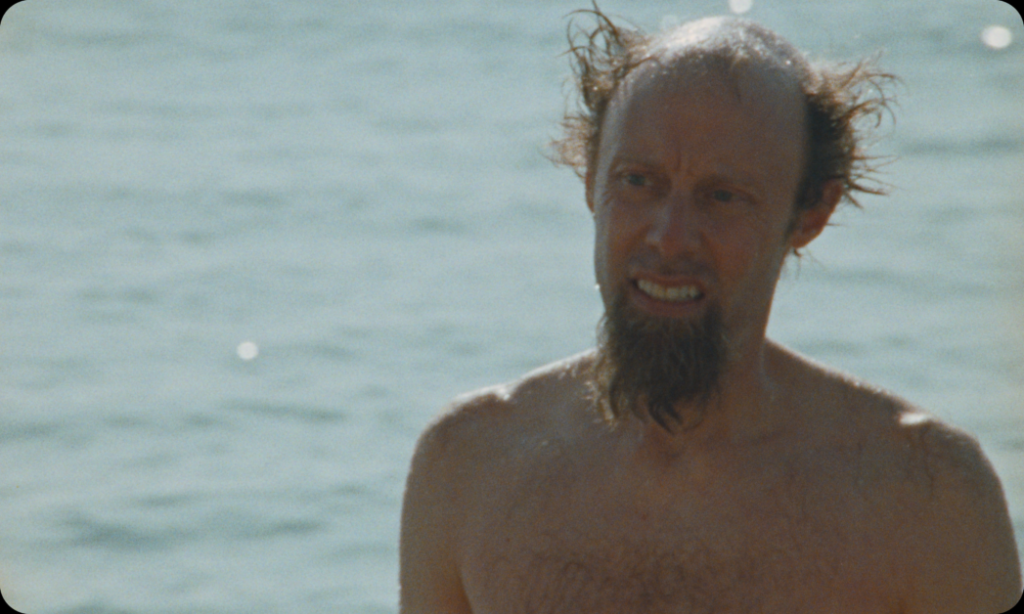
Joel, I heard a statement from you from a while ago where you said you weren’t quite ready to talk about the film yet. Now, I assume maybe some time has passed and you’ve thought about it a little bit more and you’re ready to talk about some of the deeper themes. I know this film comes from your experience with fatherhood and the fear of that transition.
Potrykus: The freakiest thing is that I’m playing a character who’s a dad and the son in the movie [Solo Potrykus] is my real son. The movie is about the insecurities and fears of fatherhood. The character says a lot of things that are happening in his life. There’s a line in the movie: “I spanked my son when he was six months old.” I’ve never spanked my son, ever, in my whole life! I’m really afraid that people are going to hate me thinking I spanked my son. “I spanked him when he was six months old.” That’s fucked up, man. I’m nervous about my son seeing it later and being like, “Woah, dad.” [laughs] If you really want to get deep, my worry is that I won’t be around anymore when he watches it and I won’t be there to explain it, so that’s how he’s going to think about his life. “Oh, my dad didn’t want me to see this movie because he admits all the things that he did to me when I was a kid.” So, yes, there’s danger to me putting it out there.
As though this movie is a letter to your son.
Potrykus: But it’s not. It’s fiction. I mean, there’s some stuff that’s real, obviously, but a lot of stuff that’s not real. My hope is that no one will bring it up in an interview or a Q&A.
Burge: It’s like, “Dude, I got spanked as a kid when I was six months old.” [laughs]
Potrykus: Part of me wants to spread the word. Headlines: Joel did not spank his son ever in his entire life.
You also look very different on screen, so there is a bit of a separation there.
Potrykus: Yeah. I don’t feel like I’m looking at myself.
That part is definitely not real. But what part is real?
Potrykus: The insecurities of whether or not I’m good enough to be a dad. Why am I the dad I am? It’s less about fatherhood from Josh’s character but it’s more about adulthood not being what he expected it to be.
Burge: I think my character is about whether or not he was a good son or a good friend or a good member of the world. “What have I contributed?” It’s a mess to deal with the responsibility of confronting that and no longer abdicating it.
It’s true, the movie is really a two-hander. Joel, you play a character who is a father and yet so much of the movie is about Josh’s character, who is not. I’m curious to hear more about how you see your fears manifested through Josh’s character. After all, he does have a scene with the son.
Potrykus: It’s cool because that was Josh’s character’s first time to show he could be a compassionate person. That was a big scene. I wanted to show that, maybe, he could be a great father. The last person you’d ever think to be a good father, he connects with the child in a way that most adults can’t connect with the child. There’s a little playfulness between them. And it was my son and my friend. I don’t know. It’s all complicated.
There’s a lot of life mirroring fiction mirroring life in that.
Potrykus: Yeah.
Was it always your intention to include your son in the film?
Potrykus: Yes, but realistically, I was like, this is probably not going to actually happen because he’s not going to want to do it.
He’s so good, though!
Potrykus: Oh, is he?
He’s so good.
Potrykus: Good. I have no perspective on that. I watch him and I’m like, “My boy’s the smartest. He’s amazing! He’s great!” How could any father say, “Hey, we might need to do another take because it wasn’t that great.” I really had no idea if he was good or not, I was just proud of him. It’s good to hear that he’s good…
Burge: Oh, he was great, man.
Potrykus: …because I was prepared to recast at the last minute.
[all laugh]
Potrykus: But I was like, “I don’t know, I think he’s good!” Ashley [Potrykus, producer], my wife, was like, “Yeah, he’s good.” That was all that mattered to us.
Burge: He was great. He was more prepared than I was. I was a little taken aback. I was like, “Whoa, now I’ve really got to bring my A-game.” I felt like I was behind the 8-ball and that I had to get this right.
Potrykus: Solo was more prepared than Josh was because Solo had one scene and ten lines. It was rehearsal, rehearsal, rehearsal. Josh is rehearsing the whole movie and then going up against someone who has laser focused on one scene for months and months, living with the director and the producer going over it.
Burge: We ran lines halfway through the shoot and I was borrowing somebody’s laptop, looking at the light. I’m like, “Oh, yeah, yeah, okay. Wait, what?” I had to get my act together.
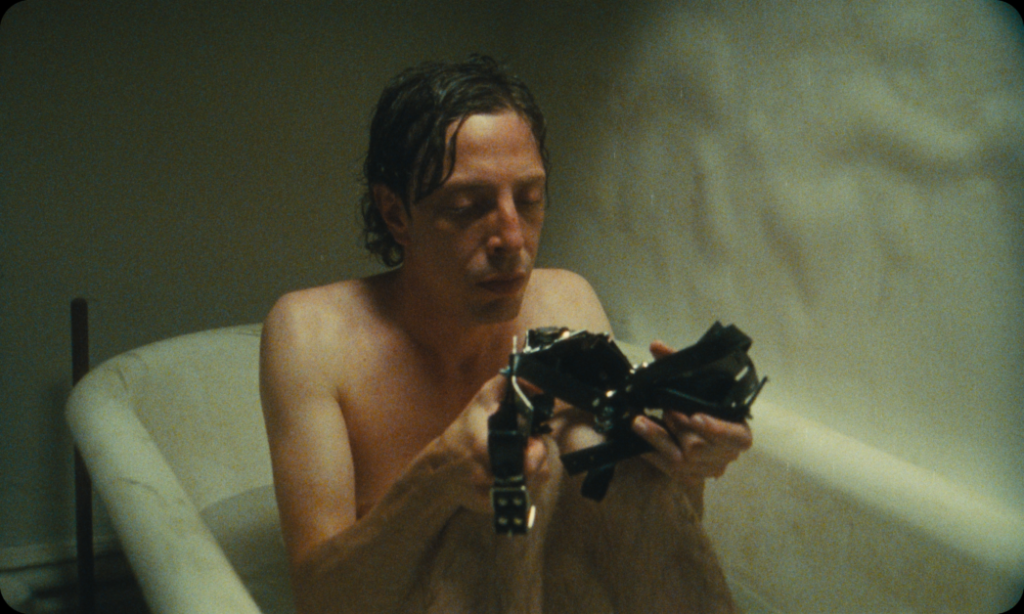
How strictly do you stick to the script? Is there room for looseness or are you Baumbach style where every ‘um’ and ‘uh’ needs to be shot?
Potrykus: A scene like that, with my son, does have to be beat for beat, line for line. I think Josh and I were a lot more strict a long time ago. Then, by working together, we just got to know each other. The important thing is intention. “This is what the scene is about.” If we get there, then great. I think we like to be prepared, so we do run it quite a bit before we roll.
Burge: It’s not like we run the whole scene or anything. We’re walking around and running it. Then you say, “Oh, how about then we say this?” It’s like, “Yeah, beautiful, that works.”
Potrykus: It’s like improv right before the cameras roll.
Burge: We just throw these ideas out and then we do them.
You both have collaborated on a bunch of films together. What do you think keeps you coming back? And what is the dance between the two of you that makes for your collaboration?
Burge: It goes back pretty far at this point. 2009. The first feature we did [Ape] was a really great time for that dance to form because it was a long shoot. We didn’t shoot that many days, but it happened over a course of several months, and that was big for our development. We had to learn how to make a movie together.
Potrykus: The first time I worked with Josh, I was like, “Oh, yeah. This is it. This is the guy I’ve been looking for to be a real serious filmmaker.” He is what I needed to elevate my craft. I know exactly how it’s going to be when I work with him. It’s like being in a band with somebody, and you just know what you’re going to get. You’re on the same page but they’ll bring new ideas. We share our favorite movies, music, humor. It’s so natural, man. As corny as that sounds, it’s how it is. I fucking hate working with a new actor because I don’t know what I’m going to get, and I don’t know how difficult or how much of a pain in the ass they’re going to be. I know exactly what I’m getting with Josh. It is going to be difficult. He is going to be a pain in the ass. [laugh]
Burge: But you know what type of pain in the ass, and that’s what’s important.
Potrykus: There you go.
The movie has a cornered cropping around the edges of the frame. It feels like you’re looking through one of those old ViewMasters. It has this vintage quality to it. What went into that choice?
Potrykus: I wish our DP, Adam Minnick, was here. Adam is the same DP we’ve always worked with. That’s another instance where you find the guy and it’s like, “Ah, he’s the guy that can help show the world how I see my ideas.” I don’t know why we were both like, “Yeah, we gotta round the edges on this.” We were obsessing over how big it was.
Burge: The size of the vignette.
Potrykus: Oh my gosh, going back and forth. There were like 30 different versions. Then, two weeks ago, we were like, “Wait, what do the rounded edges mean?” I was like, “I don’t know!” He was like, “I don’t know either!” ViewMaster, I’m leaning into it. You’re watching the movie through a motion View Master.
Well, there’s a lo-fi quality to it, which there is throughout the entire film. You have a character filming on an old camcorder, for example. The movie takes place in the present, but it feels like it could take place any year prior.
Burge: That’s a common thing that we shoot for. The time period is ambiguous as hell.
Potrykus: David Lowery’s A Ghost Story has that but it’s way more exaggerated. It makes it feel like a photo album or something and that’s what we wanted this to feel like but it’s hard to articulate why. I don’t know. David Lowery and I steal from each other often. He stole from me last, so I’m stealing from him this time.
What did he steal from you? Do you have a relationship with him?
Potrykus: We made a movie called Buzzard and David saw it. There’s a pie-eating scene in A Ghost Story––
Burge: He liked our scene from Buzzard and transferred it over.
Potrykus: I didn’t say stole.
Burge: I thought he ‘fessed!
Potrykus: Yeah. He made it his own and we’re taking his rounded corners and making them our own.
The Lowery-Potrykus Cinematic Universe.
Potrykus: David’s the best dude. He’s probably going to see [Vulcanizadora] in a few weeks at The Oak Cliff Film Festival. He’s always in the front row. When he saw Relaxer, a movie we made, right after it he said, “Oh, great, another movie for me to steal from.” It’s all yours, David.
What’s that quote? It’s like, “All great artists steal?”
Potrykus: “Good artists borrow, great artists steal.” He did not borrow the spaghetti eating scene from Buzzard, he just stole it and elevated it and people now know [A Ghost Story] for that scene. It’s how it should be, man, because that’s all we’re doing, too. Stealing from everything.
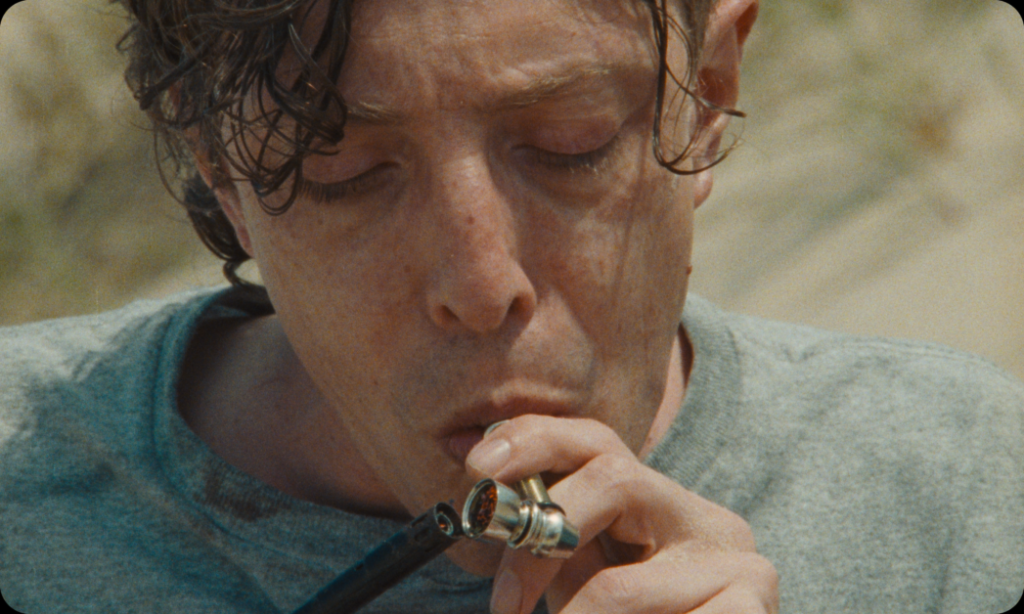
I find that a lot of independent films are pressured to be accessible and made for a wide audience. Filmmakers are discouraged from being coy about the story because the audience needs to be spoon-fed. But the whole first half of Vulcanizadora is really asking the audience to take a journey with the characters. It feels like an anti-Old Joy [the Kelly Reichardt film] because, in Old Joy, you know why they’re together, but in your film, you don’t really know and you’re forced to follow along. Joel, you’re writing, directing, producing, you’re doing all of these different things. How do you manage the push and pull of revealing information to keep the audience engaged without spoon-feeding too much?
Potrykus: When I first saw Old Joy, I was like, “This is building to something. This is going to be nasty,” and it doesn’t really happen. Vulcanizadora is the anti-Old Joy. It looks like Old Joy, feels like Old Joy, but we go there.
By the way, Old Joy is one of my all-time favorite films. This is all complementary.
Potrykus: Yeah, love it, love Kelly Reichardt. Shot on film. Adam and I referenced that more than anything, like how we wanted the woods to look and the pace of the film. That’s why I prefer to stay an independent, low-budget filmmaker because we don’t have to worry about profits and numbers. Sure, I don’t know how this is going to play on streaming when people have the ability after 20 minutes to skip to something else. It really is designed for the theater where you spend your $15 or $20 and you’re going to sit there and see the whole thing and not walk away or not come back to it. It’s designed exactly the way I wanted. If I was given $1,000,000, I don’t know if they would allow a film like this to dole out things so slowly or secretly.
I feel like a budget that large would also inflate the film in a weird way. Having less resources contains the movie.
Potrykus: Yeah, it might give me some bad ideas. Like, “We could get a crane down there. We could get a couple trucks to bring us some rigs!” You start thinking about what you could do instead of what you can do with what you have. I’m way more into restrictions than endless freedom.
Last question: the head contraption.
Potrykus: Talk to me.
I need to know, conceptually, where that came from and what it was like to work with those things. It’s flirting with the Saw universe. [laughs]
Potrykus: My idea was a lot simpler at first. I rely on my brother Charles Potrykus. He designs all of the big props and appliances in my movies. He’s like, “No, no, no, give me some time and let me come up with something cool.” We always lean into a Mad Max feel for our movies. Dust and metal and nothing pretty. When he came back with that design, I was like, “Oh yes, that’s it.” The homemade feel of it felt scary and weird and mysterious. I was super stoked. He also made them. He showed up the first day on set after flying in from Seattle with a couple of masks and was still tinkering with them and then shoved it on Josh’s head. We didn’t know how it would fit or anything.
Burge: Right, he didn’t ask for dimensions or measurements or anything. I don’t know how Chuck did it so well. I don’t know what his frame of reference was. He couldn’t have used photos.
Potrykus: Probably his own head.
Burge: It fit brilliantly, actually. It also had a sense of danger to it because there were jagged edges that you could feel as you were putting it on. They weren’t touching your face, but you knew where they were, so you could sense their presence. You knew that you had this Iron Maiden thing on your head, this medieval contraption that comes from a different age.
Potrykus: It was a fine line because it had to look like they were really stuck on there, like you couldn’t get out. When we did it, it was just at the point where I could act in it—
Burge: But you could never get it off in the heat of the moment. That was the thing. It had to be inescapable.
Potrykus: It was an uncomfortable, difficult experience for the movie, but pain is temporary. Film is forever.
Vulcanizadora held its World Premiere as part of the US Narrative Competition at the 2024 Tribeca Festival. It is currently seeking distribution.

Larry Fried is a filmmaker, writer, and podcaster based in New Jersey. He is the host and creator of the podcast “My Favorite Movie is…,” a podcast dedicated to helping filmmakers make somebody’s next favorite movie. He is also the Visual Content Manager for Special Olympics New Jersey, an organization dedicated to competition and training opportunities for athletes with intellectual disabilities across the Garden State.


